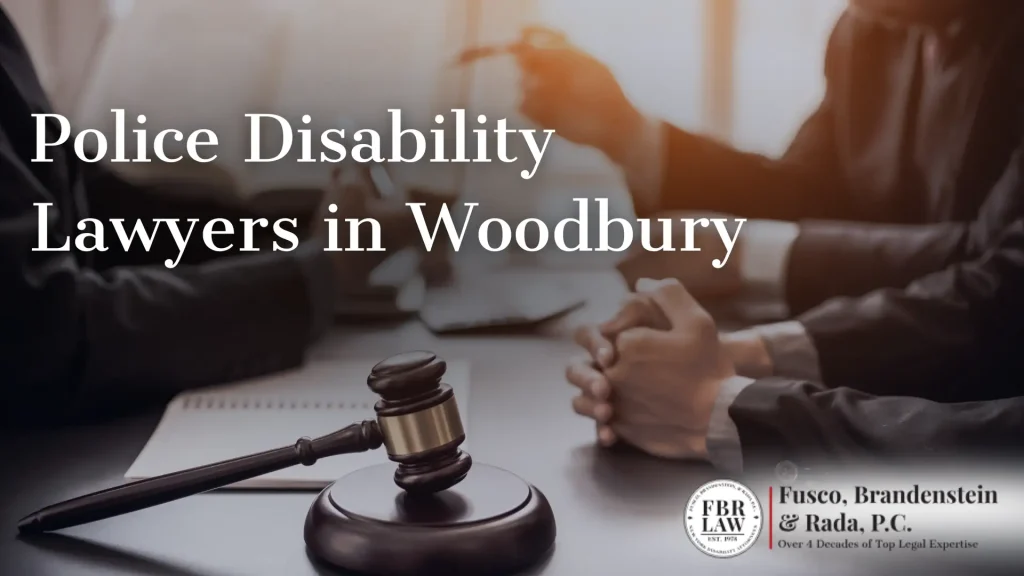
An injury or illness can throw your law enforcement career off track, and getting the disability benefits you have earned is not always easy. Many officers in New York deal with delays, denials, and too much red tape. At Fusco, Brandenstein & Rada, P.C., we are committed to providing personalized service and strong advocacy for our clients. Our legal team includes experienced Woodbury disabiltiy attorneys who understand the unique needs of local law enforcement. Our police disability attorney in Woodbury works with injured officers in Woodbury and the surrounding areas to help them push through the process and fight for the pensions they are entitled to. We know how the system works, and we are here to walk you through it and make sure you are not doing it alone.
We offer a free consultation to potential clients so you can discuss your disability or injury claim with no obligation. Our firm represents clients on a contingency fee basis, meaning there are no upfront costs and we only collect fees if we successfully recover benefits for you.
If your claim has been denied or you are unsure where to start, reach out today, either online or by calling 516-496-0400. Our Woodbury disability lawyers are ready to help.
Understanding Police Disability Pensions in New York
Police officers in New York qualify for different kinds of disability pensions depending on how their injury or illness happened. Eligibility for these pensions depends on the specific circumstances of the officer’s injury or illness. These fall under certain parts of the New York Retirement and Social Security Law. Figuring out which one fits your situation is necessary if you want to make sure you get the disability benefits you’re owed.
Accidental Disability Retirement (ADR)
Accidental Disability Retirement (ADR) is available to officers who become permanently disabled due to a sudden, unexpected event while on duty. It typically provides the most generous, often tax-free, benefits. The event must not be a routine part of the job or a foreseeable risk to qualify. For instance, falling through a broken step may be eligible, but injuries that occur while performing normal duties, such as during scheduled training, typically do not qualify for ADR. Success depends on how the event is characterized, so officers must submit detailed documentation, including reports, witness statements, and medical evaluations, to avoid denial due to misclassification.
Performance of Duty Disability Retirement (POD)
Performance of Duty (POD) benefits cover job-related injuries that do not legally count as an “accident”—like tearing a ligament while subduing someone or getting hurt during required training. While POD usually pays less than ADR, it can still help if you can’t keep working. To qualify, your injury must be tied to something you were doing as part of the job, even if it wasn’t anything out of the ordinary. The process is complicated—solid medical records and a clear explanation of what happened are key to keeping your claim from being denied.
Ordinary Disability Retirement (ODR)
ODR is for officers who develop a disabling condition that is not directly linked to a specific incident. Chronic illnesses, degenerative diseases, or mental health issues that evolve over time may fall under this category. Though the benefits are the least generous of the three pensions, ODR can still support officers whose pre-existing conditions prevent them from performing their duties.
To be eligible for ODR, the officer generally must have a minimum number of years of credited service. Supporting documentation from medical specialists is particularly important in these cases, as the absence of a triggering event makes the claim more reliant on long-term medical evidence.
PTSD and Mental Health Disability Claims
Law enforcement officers regularly face high-stress situations, and the cumulative psychological toll can lead to severe mental health conditions such as PTSD. Officers suffering from PTSD or other mental health conditions often endure significant emotional and physical hardship, which can deeply affect their daily lives and ability to work. While more agencies now acknowledge PTSD as a real and disabling condition, proving eligibility for a disability pension based on psychological injury remains difficult.
A successful PTSD claim typically requires the following:
- A formal diagnosis from a licensed psychiatrist or psychologist
- Documentation linking the condition to specific service-related experiences
- Evidence that symptoms significantly impair the officer’s ability to function
Mental health claims are sometimes dismissed due to skepticism or a lack of understanding by review boards. Experienced legal counsel can help bridge that gap by gathering compelling expert testimony and presenting the facts clearly.
Chronic Conditions and Degenerative Injuries
Not all disabilities are sudden. Repetitive stress injuries, cardiovascular issues, chronic back or joint problems, and mental health disorders often develop over years. Chronic conditions and degenerative injuries are common types of work related injuries among law enforcement personnel. In these cases, your Woodbury police disability attorney can help:
- Trace the progression of the injury through medical records
- Gather long-term employment and incident history
- Demonstrate the cumulative effect of service-related stress
Even if your condition does not stem from a single traumatic event, it may still qualify you for ADR, POD, or ODR, depending on the specifics. A legal team experienced with cumulative injury cases can help build a comprehensive narrative that connects your condition to your law enforcement service. Our firm has extensive experience representing injured workers with cumulative or long-term injuries.
Understanding New York’s Legal Framework for Police Benefits
Police officers in New York are typically covered by the Police and Fire Retirement System (PFRS). Still, benefits and procedures vary depending on your employer and classification. Specific rules govern eligibility and coverage for police officers under the Police and Fire Retirement System and General Municipal Law. Unlike most workers, police officers are excluded from standard workers’ compensation. Instead, they may qualify for benefits under General Municipal Law Sections 207-a or 207-c, which cover medical expenses, full salary during recovery, and, in some cases, permanent disability benefits.
These laws differ significantly from typical workplace injury claims, so relying on standard advice can lead to mistakes. Understanding the application process and following the correct procedures is essential to avoid mistakes and delays. Working with an police disability lawyer in Woodbury who understands law enforcement disability benefits helps protect your rights. They can ensure that your police disability claim is handled correctly from the start.
Building a Strong Disability Claim
Whether your application gets approved or denied mostly comes down to how strong it is. Building a strong case requires comprehensive evidence and attention to detail. A doctor’s note is not enough—you will need solid medical and psych evaluations, incident reports, work records, and statements from people who saw what happened. Your timeline also has to line up with what the pension board expects. And do not wait too long—missing deadlines or not responding to follow-up requests can seriously harm your claim.
Why Disability Claims Get Denied
Even concrete claims get denied, which catches a lot of officers off guard. It usually happens because the incident does not meet the legal definition of an “accident,” the injury is seen as part of regular job duties, the medical records do not line up or aren’t strong enough, something got filed late, or the board does not agree that a mental health condition is severe. If you have been denied, ask for a detailed explanation right away—you will need that info to build a solid appeal.
Appealing a Denied Disability Pension Claim
Appeals are not uncommon and often result in reversals when handled strategically. Officers may challenge denials through:
- Reconsideration applications
- Hearings before the pension board
- Article 78 proceedings in New York State Supreme Court
Each step has strict deadlines and evidentiary standards. Adding new documentation or correcting procedural errors can dramatically change a claim’s outcome. Legal representation is particularly useful during appeals because it ensures that the board’s findings are thoroughly reviewed and contested where appropriate. Our attorneys assist clients at every stage of the appeals process, from gathering new evidence to representing them at hearings.
Coordinating Other Benefit Claims
While pursuing a disability pension, you may also be eligible for Social Security Disability Insurance (SSDI), health insurance extensions, or civil claims against third parties who caused or contributed to your injury. If your injury was caused by someone else’s negligence, you may have a personal injury claim, and our firm can help identify the responsible parties and take legal action against them. The goal is to secure full compensation for all damages resulting from your injury, including those pursued through third-party claims. Pursuing multiple claims simultaneously can be complex, but it is often the best way to maximize your compensation.
Coordinating your claims strategically is essential so that one does not jeopardize another. Certain SSDI decisions can affect your pension eligibility, and settlements from third-party lawsuits may need to be disclosed.
Our Approach to Police Disability Cases
At Fusco, Brandenstein & Rada, P.C., we do not just handle disability claims—we understand the unique challenges officers face. We represent clients throughout the entire disability claim process, from initial application to appeals. Our legal team includes Woodbury police disability lawyers with experience in municipal and administrative law, litigation, and public safety benefits. Our firm provides:
- Personalized claim strategy based on your injury, job history, and long-term goals
- Assistance in gathering and organizing medical documentation
- Legal representation during pension board hearings and appeals
- Guidance on how different benefits interact with one another
We have supported officers dealing with line-of-duty car accidents, firearm injuries, traumatic brain injuries, cardiac conditions, degenerative diseases, and psychological trauma. We are committed to helping you move forward with stability and peace of mind. Our firm is dedicated to providing high-quality legal services at a reasonable cost, and we ensure clients are informed about all potential costs upfront.
Frequently Asked Questions
We’ve answered some of the questions we most often hear about these types of claims for you.
What qualifies as an “accident” under New York police pension law?
An “accident” is a sudden, unexpected event not caused by routine job activity. Events like falling through a poorly maintained stair or being hit by a civilian vehicle during patrol may qualify. Injuries during scheduled training or ordinary duties usually do not.
Do police officers get workers’ compensation in New York?
No. Police officers are not covered under the Workers’ Compensation Law. While they are not eligible to file standard workers compensation claims—such as those for slip and falls, machinery accidents, repetitive strain injuries, toxic exposure, or motor vehicle accidents—similar protections may be available under General Municipal Law Sections 207-a or 207-c, depending on your department. These laws can provide full salary and medical care for duty-related injuries.
How long does the disability pension process take?
Initial decisions typically take several months. The timeline may extend to a year or longer if an appeal is needed. Starting with a complete and well-supported claim helps avoid unnecessary delays.
Talk to a Police Disability Attorney in Woodbury
Filing a disability claim can be a significant step for an officer who has become disabled. Whether your condition came on fast or built up over time, the benefits you get—or don’t get—can seriously impact your future. Disability benefits can help replace lost wages and provide money for medical expenses. If you’ve been denied, stuck in the paperwork, or just don’t know where to start, having a lawyer in your corner can help.
Our team of attorneys work with doctors to ensure all necessary medical documentation is included in your claim. We also help clients pursue all available workers compensation benefits to maximize their financial recovery. Discover our office on Google Maps and explore our reviews to understand why we’re well-rated.
Contact Fusco, Brandenstein & Rada, P.C. at 516-496-0400 to talk with a police disability attorney serving Woodbury. We know how complicated New York’s disability system can be. We’re here to help you fight for the benefits you’ve earned.
